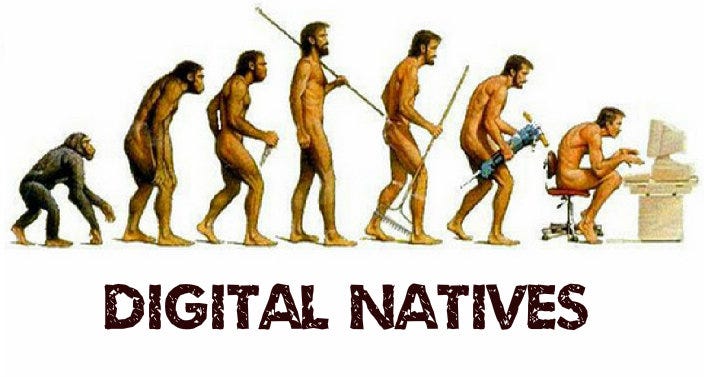 |
| From the article "Do Digital Natives Exist?" |
Prensky argues that digital natives are essentially entirely different people from those who came before them, and therefore require a different way of teaching (2). While I personally feel that my affinity for technology has helped me easily adapt to online education (which was established long after this article was written), I do not feel that it affected my education preceding my online schooling. If it were not for a global pandemic changing the way the entire world functions (which was enabled my the prevalence of technology), then it is likely that being a "digital native" would have never had a significant impact on the way I learned.
Prensky predicts that education would shift its focus towards games to appeal to the digital generation (5). Over two decades later after this bold prediction, we can safely say this is not the case. Video games are used predominantly as a form of leisure, which has not changed since their conception. Prensky's prediction never made sense in the first place due to its level of generalization. Not everyone of the younger generations enjoys playing video games, so it would not work as an effective form of education for everyone. He speaks as if every "digital native" emerges from the womb with vast technological knowledge, which is simply not the case. This knowledge must be learned by both younger and older generations. It is only easier for younger generations to pick up technology because they are exposed to it from a young age; they learn it early when they are still impressionable. Older generations got used to a world that was not dominated by digital media and struggle with it because they are set in their ways.
 |
| From the article "Digital Immigrant vs. Digital Native" |
Change can be frightening when you are used to a certain way of doing things, but those who do not resist it will have an easier time adapting to it. An elderly person who is willing to learn the digital ways can have a higher proficiency in technology than a teenager who had very little technological exposure growing up. Age is not the important factor, but experience. Paul Kirschner describes this idea as being digitally literate. This concepts refutes the idea that technological proficiency is tied with our age, but rather it is a skill that can be learned by anyone at any age. Digital literacy is a better way to describe the "digital language" that Prensky mentioned earlier. For example, those who grew up speaking English will have an easier time learning English concepts, while someone who learns English as a second language will have a more difficult time because it is different than what they are used to. Regardless, both individuals can achieve the same level of proficiency at English. Perhaps the one who learns it as a second language could even surpass the abilities of the native English speaker. Digital literacy works the exact same which is why the generation you are born in and being a "digital native" does not equate to having digital literacy.
Here is an educational YouTube video which contains a more modern definition for the term "digital native": Digital Natives VS Digital Immigrants. It contains many silly comics that help illustrate the idea and inspired the images I used for this blog.



No comments:
Post a Comment